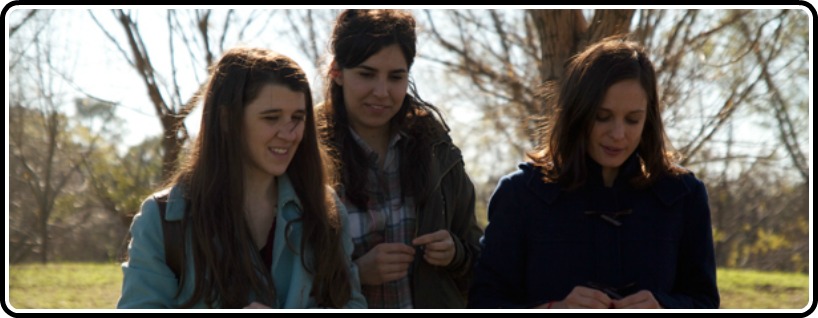Apparently Joss Whedon isn’t the only director with an affinity for adapting works from The Bard.
With the Avengers director back in 2013 with his (fantastic) take on Shakespeare’s Much Ado About Nothing, Shakespeare’s Twelfth Night gets a day in the spotlight thanks to Argentinian filmmaker Matias Pineiro and his equally great new picture, Viola. However, it’s not the straight adaptation one would expect from a director taking on one of the greatest literary voices in history.
Clocking in at a taut 65 minutes, Pineiro’s film tells the story of a group of actors, and their romances while staging a performance of The Bard’s classic. We meet Viola, the closest thing the film has to a real lead, a member of Buenos Aires’ bohemian set, and also the delivery system for bootleg DVDs that her boyfriend copies for customers. Pineiro’s third feature film, Viola is a provocative and free-spirited meditation on romance and the relationships being woven by this singular theater troupe.
Mixing in Shakespearian dialogue with natural conversation, Viola is an absolutely breathtaking experiment in adaptation. Pineiro goes into full Jaques Rivette mode with this picture, and it’s as exciting a film as we’ve seen in quite some time. Pineiro’s script is easily the film’s strongest aspect, with the aforementioned blend of found and natural dialogue turning the film into a percussive romance drama, that proves The Bard’s voice is still as vital as it was centuries ago. The looseness with which the script uses dialogue is effective, and it fits the equally freewheeling aesthetic and the bohemian nature of its core cast.
Hazy and naturalistic, Pineiro proves to be a real stud behind the camera as well. Pairing a beautiful cast with a city that seems to take a back seat to a story of an artistic troupe’s romances, the film gets stunning photography from Fernando Lockett and the long, lyrical takes make the editing from Alejo Moguillansky as powerful as any we’ve seen this year. Pineiro uses a cavalcade of close ups and long takes to add a sense of naturalism to a film that would have otherwise felt a tad put on and false (my one major issue in Whedon’s previously mentioned adaptation was that very fact), and everything within this world, while heightened, feels like it could exist in this universe. There are moments of true bravura filmmaking (I’m thinking of a continual conversation between two women that ends abruptly with the most exciting single edit of 2013) and quiet realism, and it is in this pairing that the film really comes alive.
And thankfully, the performances are just as great. Maria Villar stars as Viola, and while it’s tough to call her our central character, it is her story that we follow the closest to. Her face is a perfect canvas for Pineiro to paint his story upon, and her relationship to the word around her feels real and powerful. Agustina Munoz is arguably the strongest in the cast, and it is an interaction with Elisa Carricajo’s Sabrina that proves to be the best single scene in the entire film.
The greatness of that single scene gets to the power of the actual film. While the blending of source and original dialogue may seem put on, it is the story, and its use of The Bard’s work that makes this a real wonder of experimentation. The film’s characters, through both their own words and Shakespeare’s work, attempt to iron out real and vital romances without ever allowing the artifice become just that, artificial.
An absolute stroke of genius, Pineiro, with Viola, proves that he is as exciting a voice in foreign cinema as there is today. Sexy, erotic, inventive and powerful, Viola is a breathtaking meditation on romance as told by one of today’s most intriguing cinematic artists that is as playful in its blurring of fact and fiction as it is stunning in its beauty.




![Bergman Island (The Criterion Collection) [Blu-ray]](https://criterioncast.com/wp-content/uploads/2022/11/bergman-island-the-criterion-collection-blu-ray-400x496.jpg)
![This Is Not a Burial, It’s a Resurrection (The Criterion Collection) [Blu-ray]](https://criterioncast.com/wp-content/uploads/2022/11/this-is-not-a-burial-its-a-resurrection-the-criterion-collection-blu-ray-400x496.jpg)
![Lars von Trier's Europe Trilogy (The Criterion Collection) [The Element of Crime/Epidemic/Europa] [Blu-ray]](https://criterioncast.com/wp-content/uploads/2022/11/lars-von-triers-europe-trilogy-the-criterion-collection-the-element-of-400x496.jpg)
![Imitation of Life (The Criterion Collection) [Blu-ray]](https://criterioncast.com/wp-content/uploads/2022/11/imitation-of-life-the-criterion-collection-blu-ray-400x496.jpg)
![The Adventures of Baron Munchausen (The Criterion Collection) [4K UHD]](https://criterioncast.com/wp-content/uploads/2022/11/the-adventures-of-baron-munchausen-the-criterion-collection-4k-uhd-400x496.jpg)
![Cooley High [Criterion Collection] [Blu-ray] [1975]](https://criterioncast.com/wp-content/uploads/2022/11/cooley-high-criterion-collection-blu-ray-1975-400x496.jpg)